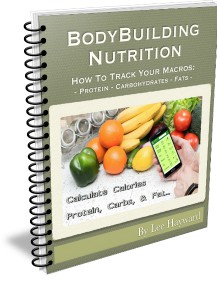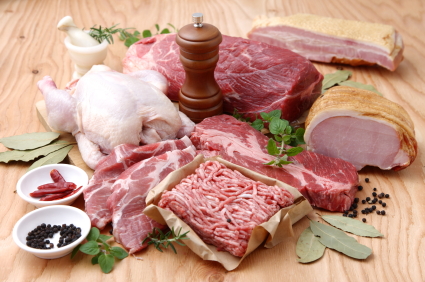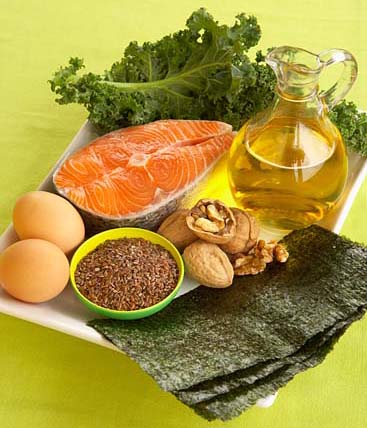| Bodybuilding Nutrition How To Track Your Macros – Protein, Carbs, and Fat. To help you keep track of your macros easier, |

|
Protein…
Protein is the most important nutrient for bodybuilders. Protein is the raw material needed for muscle growth. It provides your body with the amino acids that are required to build and repair muscle tissue. Protein was discovered by Jöns Jakob Berzelius in 1838. The word “Protein” is derived from a Greek word “protas” meaning “of primary importance”, because of the fundamental role of protein in sustaining life. You should eat at least 1 gram of protein per pound of “lean bodyweight” each day.
For Example:
– A 200 pound man with 15% bodyfat has 170 pounds of lean bodyweight and 30 pounds of bodyfat.
– 170 pounds of lean bodyweight X 1 gram of protein = 170 grams of protein per day.
|
Good Sources Of Protein:
>> Lean Beef (steak, ground beef, etc.) |

|
2 Main Categories Of Protein:
1) Slow Digesting Protein
Solid food protein such as meat, eggs, chicken, fish, etc. fit in this category. These foods will make up the majority of your protein intake throughout the day. They take time to eat, digest, and get absorbed by the body. Another good source of slow digesting protein is casein protein, which comes from dairy foods. The protein found in milk and cheese is about 80% casein. The casein molecule forms a gel or clot in the stomach, which provides a sustained slow release of amino acids into the blood stream, sometimes lasting for several hours. Because of its slow digesting properties, casein is widely used before bed to help bodybuilders maintain a positive nitrogen balance during sleep.
2) Fast Digesting Protein
Protein supplements, especially whey protein, fits in the category of fast digesting protein. Fast digesting protein is best consumed before and after exercise when your body needs a quick and easy source of amino acids to help repair muscle tissue. A lot of bodybuilders will also take Branched Chain Amino Acids (BCAA’s) during their workouts to help prevent muscle breakdown during strenuous exercise and keep the body in an anabolic state. Protein is the building blocks of muscle tissue, and amino acids are the building blocks of protein. So when you consume amino acids they are digested and utilized by the body very quickly and go right to the working muscles.
Carbohydrates…
Carbohydrates provide a “protein-sparing” effect. When your carbohydrate intake is too low your body will convert protein into glucose for energy. This process is called “glyconeogenesis”. Eating adequate carbohydrates is important because if your body doesn’t have enough, it has to metabolize more protein and this depletes the muscles.
Eating too few carbohydrates will leave your muscles looking and feeling flat. Muscle fullness largely depends on the glycogen stores within the muscle cells. Your muscle glycogen stores greatly impact your strength and energy levels in the gym and whether or not you get a “pump” while working out. If you have ever followed a low carbohydrate diet for any length of time I’m sure you have also noticed a significant loss of strength in the gym during your workouts and your muscles feel flat as a pancake making it almost impossible to get any decent pump while working out.
While your protein intake should remain steady at all times, your carbohydrate intake will vary greatly depending on your fitness goals. If your goal is to get bigger and gain muscular size then you’ll need to eat upwards of 3 grams of carbohydrates per pound of “lean bodyweight” per day. If your goal is to lose bodyfat and get leaner then you’ll need to eat around 1 to 1.5 grams of carbohydrates per pound of “lean bodyweight” daily.
For Example:
– A 200 pound man with 15% bodyfat has 170 pounds of lean bodyweight and 30 pounds of bodyfat.
– 170 pounds of lean bodyweight X 3 grams of carbs = 510 grams of carbs per day (muscle gain).
– 170 pounds of lean bodyweight X 1.5 grams of carbs = 255 grams of carbs per day (fat loss).
You can eat larger portions of carbohydrates with your breakfast and with your post workout meals. At these times your body needs more carbs for muscle growth and recovery.
There are some advanced diet strategies that involve “carbohydrate cycling” where you’ll go through phases of high, medium, and low carbohydrate intake to maximize muscle growth and fat loss. We can dive into that stuff later on as you become more advanced, but for now we’ll focus on mastering the basics.
|
Good Sources Of Carbohydrates:
>> Whole Grain Breads: 100% Whole Wheat, Pumpernickel, Rye, Oat Bran, Buckwheat, Barley Kernal. |

|
3 Main Categories Of Carbohydrates:
1) Starchy Complex Carbs
These include foods like oatmeal, cream of wheat, oat bran, brown rice, potatoes, yams, quinoa, whole wheat pasta, whole wheat bread, etc. These foods are generally very filling and provide a steady release of sustained energy.
2) Fibrous Carbs
These include foods like green veggies, lettuce, cabbage, broccoli, sprouts, spinach, cauliflower, peppers, cucumbers, zucchini, etc. These are the foods most people don’t like eating LOL. They are not so much eaten for energy or calorie intake, but for the health benefits. Vegetables provide fiber, vitamins and minerals. They are also great sources of phytonutrients such as chlorophyll, polyphenols, carotenoids and other antioxidants that help protect the body from free radical damage. Vegetables also help to balance out the acid / alkaline levels in your body. Protein foods are naturally very acidic, but by eating lots of green veggies you can maintain a proper acid / alkaline balance and keep your body in a more anabolic state.
3) Simple Carbs
These are generally referred to as the “bad carbs” and include things like sweets, sugar, maple syrup, honey, candy, most processed and packaged foods like cookies, crisps, and other kinds of “junk-foods”. Simple carbs are digested quickly and cause a rapid insulin spike. This is associated with a high in energy followed by a quick crash in energy. Often referred to as the “Sugar High” followed by the “Sugar Crash”. In addition to uneven energy levels, these foods also cause fat gain and are best to be avoided.
Fat…
Fat is a very important part of a healthy bodybuilding nutrition program. Your body needs an adequate fat intake to function properly. Besides being an energy source, fat is a nutrient used in the production of cell membranes, as well as in several hormone-like compounds called eicosanoids. These compounds help regulate blood pressure, heart rate, blood vessel constriction, blood clotting and the nervous system. In addition, dietary fat carries fat-soluble vitamins — vitamins A, D, E and K — from your food into your body. Fat also helps maintain healthy hair and skin, protects vital organs, keeps your body insulated, and provides a sense of fullness after meals.
|
3 Main Categories Of Fat:
1) Saturated You need to eat all 3 in the right balance in order to maximize your muscle growth, fat loss, and overall health. Saturated Fat comes from animal products (i.e. meat). You will get adequate saturated fat intake from your protein foods. Foods like beef, chicken, eggs, etc. all contain saturated fat. Monounsaturated Fat comes from foods such as seeds, nuts, olives, avocados, as well as various types of oils such as peanut oil, flaxseed oil, sesame oil, corn oil, canola oil, and olive oil. Polyunsaturated Fat is found in sea food like herring, salmon, mackerel, halibut, and fish oils. |

|
By getting your protein intake requirements with animal products such as beef, chicken, fish, eggs, etc. and including nuts, seeds, olives, in your diet, as well as cooking with healthy oils such as olive oil you’ll meet the majority of your dietary fat needs. Generally around 0.5 grams of fat per pound of “lean bodyweight” daily is a good number to shoot for.
It would be a good idea to also supplement your diet with fish oil capsules. Simply take a couple capsules with each meal. Fish oil is high in omega 3 fatty acids and it is also high in EPA and DHA fatty acids. These fatty acids are antioxidants and help with muscle growth and fat loss. They also have health benefits with anti-cancer and anti-inflammatory effects. Studies have shown that taking 10 grams of fish oil per day can increase your metabolic rate and enhance muscle building and fat loss.
Water…
This is an extra one that I wanted to add in because it’s very important, but often ignored…
A little know fact about water is that the less you drink, the more likely you will become overtrained with your workouts. Muscle is comprised of over 70% water. Sweating from hard workouts causes you to lose body water. Eating a high protein diet increases your body’s need for water. And water is needed as a transport mechanism for various nutrients, vitamins, and minerals. If your water intake is too low, your ability to transport nutrients to your muscles becomes compromised, you’ll lose muscle fullness, and toxins will build up in the body.
To stay adequately hydrated you should drink 0.6 ounces of water per pound of bodyweight daily. To put this in perspective a 200 pound man should drink 120 ounces of water over the course of the day. That’s about 15 glasses of water daily. While this may seem like a lot, it is not that hard to consume this much water. Simply having a glass or two with each meal would equal about 10 glasses. And then sipping water from a water bottle during the day and during your workouts can easily make up for the other 5 glasses. As I am writing this right now I have a water bottle on my desk that I’ve been sipping from all morning. When I’m at the gym I always keep a water bottle with me at all times so I can take sips in between sets to keep myself hydrated.

(Note: this is an average water intake, if you live in a particularly hot climate or have a physically demanding job where you are working hard for long hours then you may need to drink even more water.)
If you have any questions or comments about protein, carbohydrates, fat, or water intake
please post them in the forum and we’ll chat there 🙂